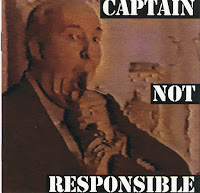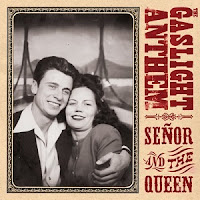Captain Not Responsible -- Captain Not Responsible
I'm pretty certain I picked up Captain Not Responsible's self-titled EP in one of the two CD stores I used to frequent when I attended high school in Sogndal, but I'm not sure which one. What I do remember, though, was immediately liking what I heard when I "test-listened" to the CD up at the counter.
Despite the band's rather irritating choice of cover art, Captain Not Responsible is not the sort of unintelligent hard rock record you might expect from a band choosing to place an image of disgraced Pennsylvania State Treasurer R. Budd Dwyer committing suicide on a record sleeve. (For those people unfamiliar with R. Budd Dwyer, the 47-year-old politician killed himself during a televised press conference in 1987 after being accused of having accepted a three hundred thousand dollar kickback and facing more than a half-century in prison. Images of the man placing a revolver in his mouth and subsequent footage of his brains splattering on the wall behind him have long been staples of shock rock bands attempting to find outrageous material to screen during performances). Rather than the garden-variety lyrics about violence and assorted bits of tough-guy posturing, the boys in Captain Not Responsible sing about the idiocy of fascism (I know, not the freshest of thematic ground, but give them credit for trying), the pathetic tendency of some people to wallow in self-pity and for others to use alcohol abuse as an excuse for inaction. Truthfully, the lyrical content really makes the record stand out from the pack of decent-to-good hardcore bands playing in the mid-nineties. Still, it's all backed up by all the chugging guitars and gruff vocals could ever ask for. Crank the volume up on this one.
Track Listing:
Track 1. "Self Pity." A staple on my radio program in the nineties, this song is so anti-emo that you just have to love it. A tale of a guy who is "so in love with his misery," "so in love with his tragedy," "so in love with the tears in his eyes" that he's too blinded to appreciate what good life has to offer. Of course, "nothing really matters to an asshole, anyway," so he just wallows and wallows. Seriously, isn't there someone we'd just love to shout this to? And aren't they exactly the person who, although he or she "could be someone," won't ever do a thing about it because they're "just in love with [their] selfish fucking self"? The singer, who has presumably suffered from an equally solipsistic bout of depression, tries to shake some sense into the auditor, though we sense the effort is futile. Fortunately, "Self Pity" is a skull-thumping slab of punk fury, so some good has come of it all. Catharsis rarely sounds this exhilarating.
Track 2. "The Latest New Order." Though I suspect some cynical listeners will roll their eyes when "The Latest New Order" comes on the stereo, claiming that the track is simply the obligatory bit of anti-Nazi sentiment many hardcore bands (in a scene polarized by political tensions between a minority fascist element and a larger anti-fascist demographic) penned to clarify their positions on certain sociopolitical issues, Captain Not Responsible does attempt to take a slightly more unique angle to this well-trod thematic territory. Sung in the first-person, "The Latest New Order" recounts the story of a "warrior" of the "master race" as he initially welcomes the Nazi doctrine before ultimately discovering, at the hands of a brutalizing element of self-purging "purifiers" among his former peers, that anyone can be dehumanized by inhuman doctrine. While images of alcohol-fueled brutality and violence-inspired priapism are certainly unoriginal, the band's attempt to depict how "rules changed overnight" and the political climate one embraces can suddenly turn on the formerly enthusiastic acolyte is less tired an approach to the topic. In the end, "The Latest New Order" is an admirably impassioned screed attacking fundamentalism in such a way as to be both specific in focus and applicable to a much broader range of modes of thought. The chugging hard rock beat and gruff vocals, of course, make for a good song, too.
Track 3. "Amnesia." The EP's third number is an anti-nihilist rant, cynically accusing humanity of complacently refusing to learn from its past mistakes and, thus, doomed to the tragic repetition of foibles great and small.
Track 4. "No Colombo Tonight." Another accusatory tune, "No Colombo Tonight" attacks the well-documented tendency for mass media to transform horrific news into infotainment that will keep viewers enjoying what, for others, is a life-shattering ordeal. Furthermore, it laments the ways in which "a cheering crowd" can allow someone to make "himself a name / with bigger gun than brain."
Track 5. "This Might Be My Second to Last Beer." Another first-person account, "This Might Be My Second Last Beer" expresses the speaker's sense of existential futility and attempts to justify his or her alcoholic surfeit as a legitimate response to his inability to overcome life's insurmountable challenges or to effect any perceptible change in the world. Sensing that he can never really get what he wants, the singer reveals that, like many a stereotypical activist, he is more prone to talking about the changes he'd like to make than he is to actually take action. Thus, s/he takes a "second last beer," thereby prolonging the period of bitching and moaning while delaying the moment he or she must walk the walk.
Track 6. "Another Day." In many ways the bleakest song on the record, "Another Day" picks up where "This Might Be My Second to Last Beer" leaves off. The musings of someone who keeps waiting for some vague future time during which action will be possible only to realize that every day that passes is, in effect, the "trad[ing of] a handful of something / For a whole lot of nothing at all," "Another Day" is yet another critique of the band's favorite target: the apathetic, self-pitying individual who, despite the potential for real action, squanders his or her life waiting.
Sobriquet Grade: 83 (B).




Comments